RELATED: Start Up Software For Project Management | Software For Project Management For Small Businesses | Software For Project Management For Small Teams
Is your company struggling to compete and maintain a high level of productivity? Project management software smooths the product development process. You can easily oversee employees while assigning teams and positions. Create more realistic timelines and projections. Closely evaluate worker performance to ensure everyone remains on-task. Here are our picks for the ten best choices in project management software for product development.
Upfront Conclusion
The best project management software for product development right now is Product Plan and Air Focus
7 Best Project Management Software for Product Development
- Product Plan – Our Top Recommendation
- Air Focus – The Runner Up
- HeySpace – A Small Business Standout
- Wrike – Our Top Enterprise Recommendation
- Accelo – Easy Integration Solution
- Monitask – Mid-Sized Business Solution
- Monday – A Fan Favorite
1. Product Plan – Our Top Recommendation
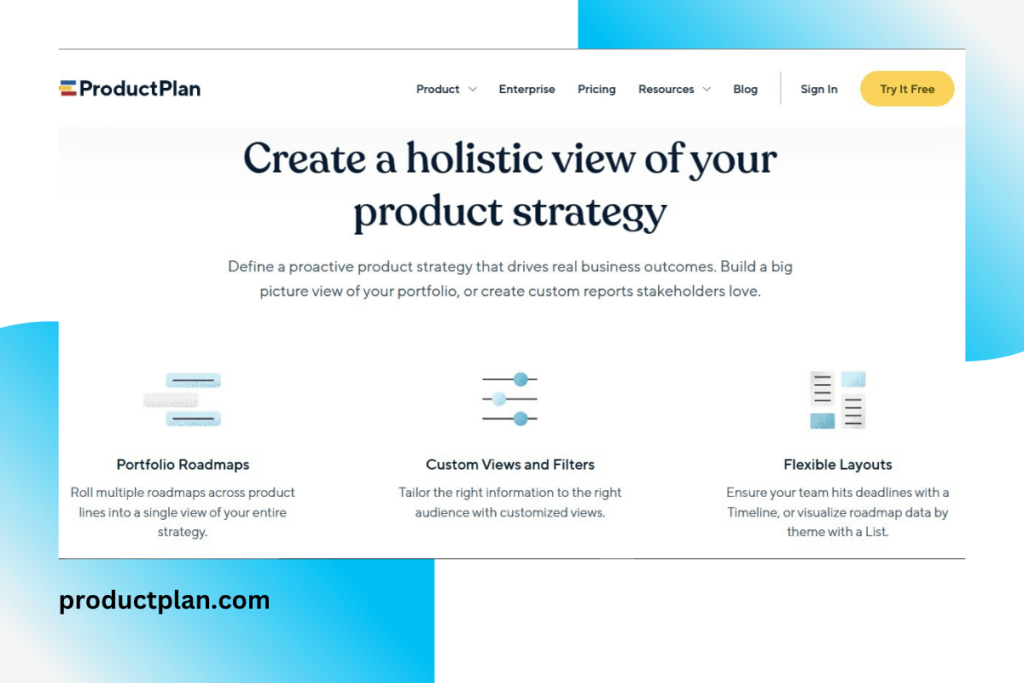
PRICING: Prices vary based on the number of users.
ProductPlan provides a roadmap for getting things done. The software delivers increased visibility. The brand was founded in 2013 and is located in California, USA. Since its inception, it has taken off and become a very popular resource for product development. The majority of Product Plan’s clients come from the USA and India. A 14-day free trial allows you to consider the software before making a permanent switch.
KEY FEATURES:
- Story features provide overviews and visual maps of projects in motion.
- Ease of use options makes onboarding simple. New users find it easy to adapt to the program.
- Jira integration and unlimited roadmaps.
REASONS TO BUY:
- Product Plan boasts a client list rich with recognizable brand names. Clients include McDonald’s, Southwest, Microsoft, and Liberty Mutual. The company is trusted by multinational brands that understand the importance of project management.
- The software integrates well with many current business apps. Slack, Trello, and Microsoft Teams are all compatible
REASONS TO AVOID:
- There is no roll-back feature. If users make errors, it can be difficult to undo mistakes.
2. Air Focus – The Runner Up
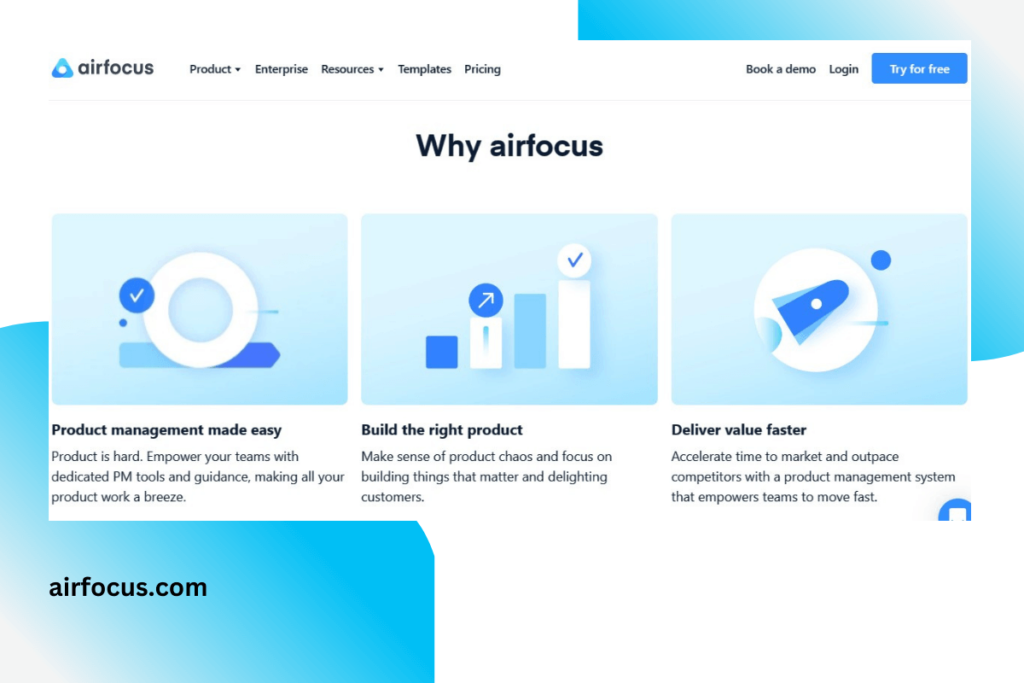
PRICING: Air Focus offers monthly plans from $15. Professional and Enterprise plans start at $89/month.
Malte Scholz, Christian Hoffmeister, and Valentin Firak founded Air Focus in 2017. The company offers a fresh, creative project management SaaS. Air Focus is headquartered in Hamburg, Germany. From a start-up, the company has grown into a popular solution for project management.
KEY FEATURES:
- Simple roadmap builder uses drag-and-drop technology to help you quickly layout your vision. Multiple roadmaps can be layered for a full overview.
- Selection features allow you to choose who can view and modify roadmaps and planning tools.
REASONS TO BUY:
- Air Focus has won numerous awards and has a sterling reputation. The company is a user favourite in many categories.
- The company has a very strong reputation for security. Data is protected and Air Focus is compliant with European standards.
REASONS TO AVOID:
- Some users find adding new criteria makes scoring difficult or alters existing data.
- The software is more expensive than some competitors.
3. HeySpace – Small Business Standout
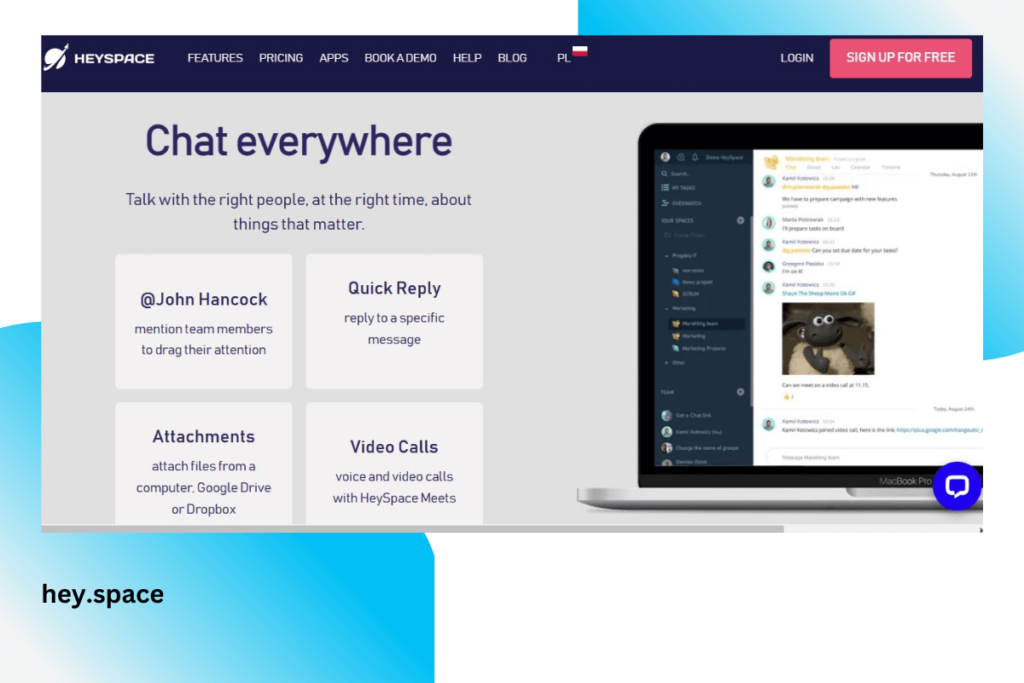
PRICING: From $19.99/month.
HeySpace launched in 2009 and is headquartered in Poland. Kamil Rudnicki, the founder, has remained at the helm throughout the company’s growth. The software offers a unique approach to project management for product development. HeySpace enables a deeper level of communication that brings together all members of the development team. Resources and assignments can be easily allotted by role and group.
KEY FEATURES:
- Constant communication through one-to-one and group chats. Users can see each other face-to-face despite being at different locations. Group chats let you mention individuals by name to get their attention.
- A structured storyboard allows members to vote on tasks and make recommendations.
REASONS TO BUY:
- HeySpace offers a free version that meets the needs of small businesses and startups. You can experiment with the software before upgrading.
- The timeline, storyboard, and overwatch features let you plot goals at the smallest level to ensure the project comes together on time.
REASONS TO AVOID:
- HeySpace is best utilized by smaller companies. An enterprise may not find the software meets the company’s needs.
4. Wrike – Our Top Enterprise Recommendation
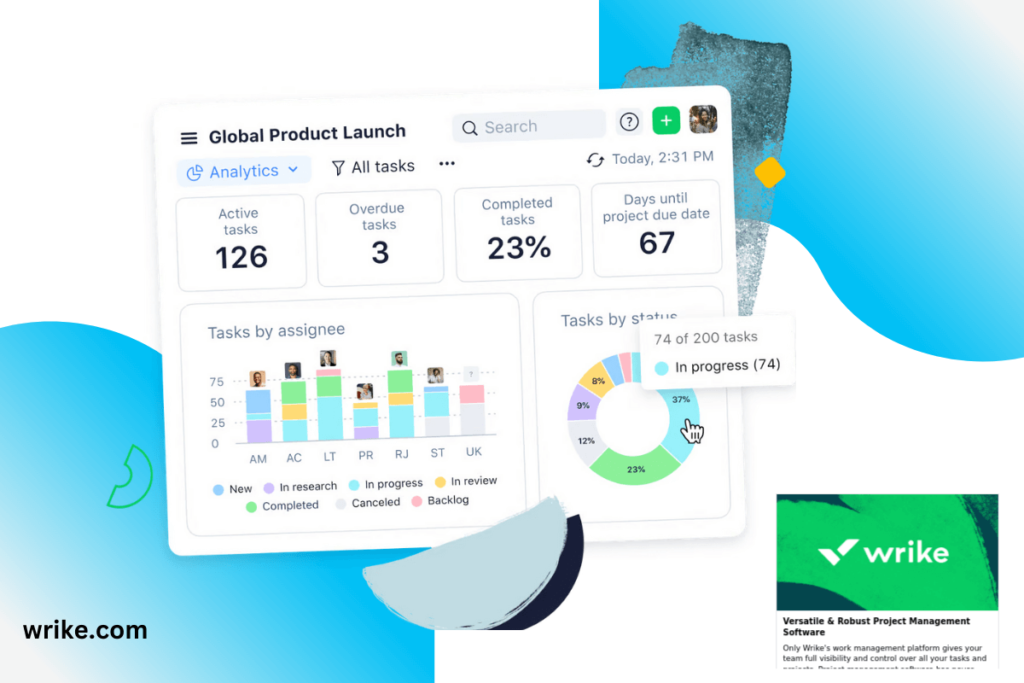
PRICING: Packages start at $10/month.
Andrew Filev launched Wrike in 2006. The seed money for Wrike came from Filev’s personal accounts. He believes in the product and continues to be deeply involved as CEO of the company. Wrike is based in California, USA. The company offers specific solutions for product development and management.
KEY FEATURES:
- Wrike’s Work Intelligence software learns from experience and serves to make tasks easier. Risk projections and analytics data are easily available at any time.
- Wrike offers an interactive training program that helps new buyers acclimate to the software and make the most of it.
REASONS TO BUY:
- Wrike boasts an impressive client list. Walmart, Google, KitchenAid, Estee Lauder, Sony, and many more companies trust Wrike.
- Wrike can be integrated with many popular tools and software options.
REASONS TO AVOID:
- A small number of reviewers report data losses. Experimenting with the software may be required to figure out features.
5. Accelo – Easy Integration Solution
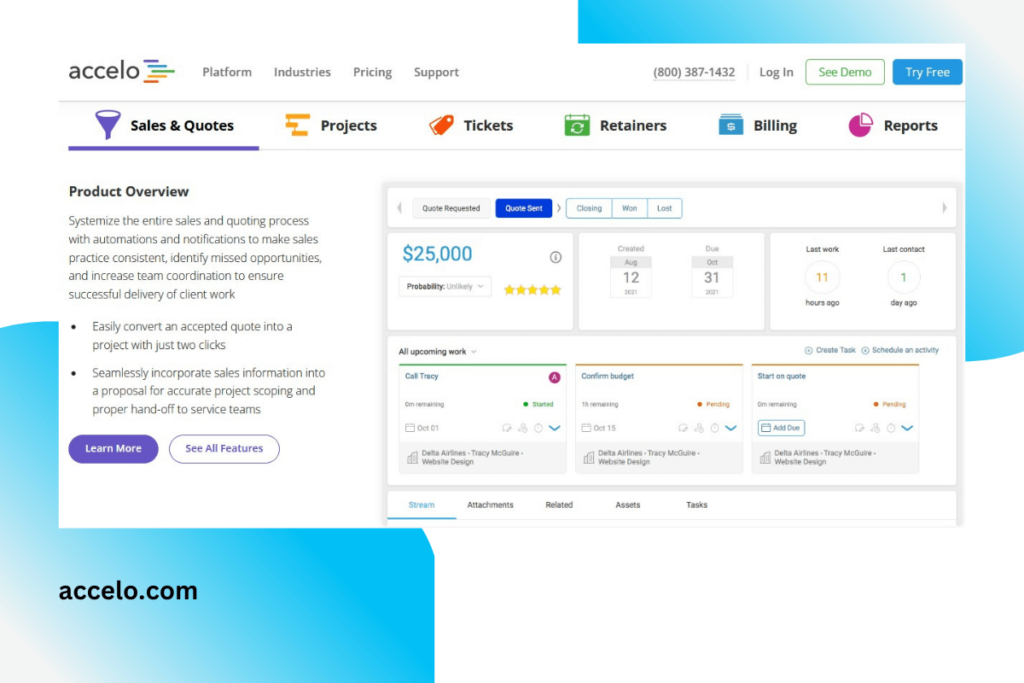
PRICING: $24/user monthly.
Accelo is dedicated to project management across multiple industries. The company was founded by Geoff McQueen. It launched in 2009. Accelo is headquartered in San Francisco, California. There are also offices in Denver, Colorado and Wollongong, Australia.
KEY FEATURES:
- Adaptive project management allows for flexibility.
- Dynamic scheduling allows you to make either firm or rule-based schedules.
- Project time-logging.
- Forecasts and predictions that adapt to new data.
REASONS TO BUY:
- Accelo understands you already use many tools and resources. The company is dedicated to making integration a snap. Accelo works with Slack, Microsoft, QuickBooks, and many more.
- Some clients have seen significant numbers increases, including revenue and billable time.
REASONS TO AVOID:
- The UI isn’t as attractive as some alternatives. Accelo lacks the more complex features and layout options some competitors offer.
- There are no European offices for Accelo and the software may not comply with EU requirements.
6. Monitask – Mid-Sized Business Solution
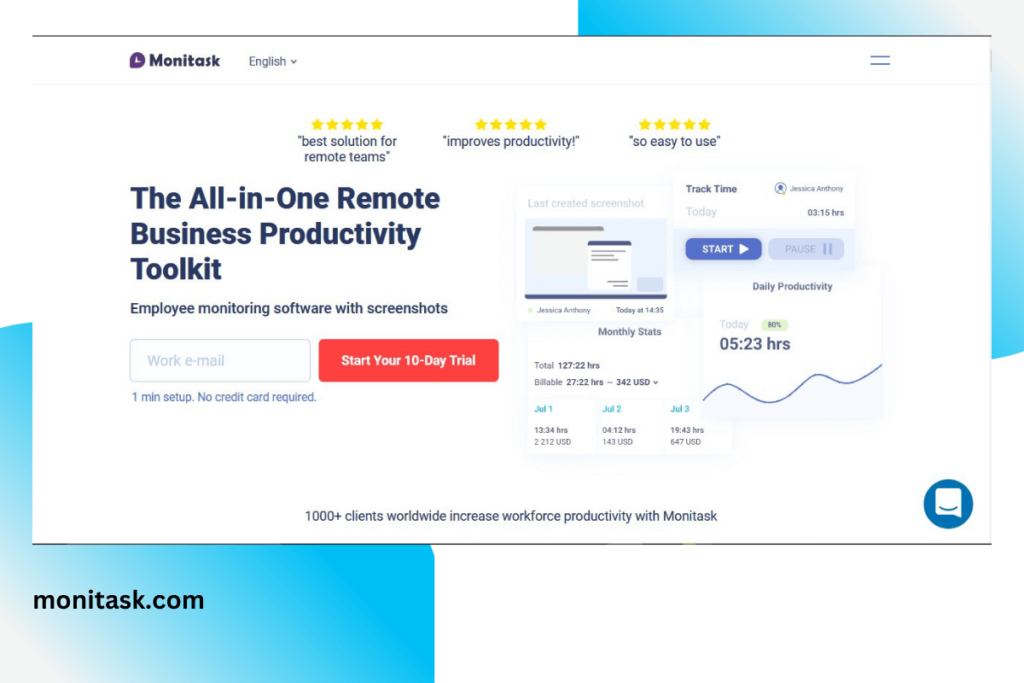
PRICING: Plans start at $5/month for one user.
Monitask is a latecomer to the project management table, but the company has made up for this by blossoming into a top-notch solution. In 2016, Thomas Simon launched Monitask intending to increase productivity and get results. Monitask is based in Oregon, USA.
KEY FEATURES:
- Monitask offers a host of remote work solutions enabling project leaders to manage off-site employees. Teams can work from home or on the go with chat, video conferencing, and smart clock-in.
- The activity monitor takes screenshots of team devices to ensure everyone remains on-task throughout the workday.
REASONS TO BUY:
- Monitask is uniquely focused on the needs of mid-sized businesses. A balance of features is available.
- Monitask is best for tech, e-commerce, and business. The solutions meet the unique needs of these industries.
REASONS TO AVOID:
- Monitask doesn’t come with a smartphone app. Many companies want this option, so an alternative may work best for them.
- Reviewers say downloading and maintaining data is difficult once they cancel the service. Some companies have lost important data this way.
7. Monday – A Fan Favorite
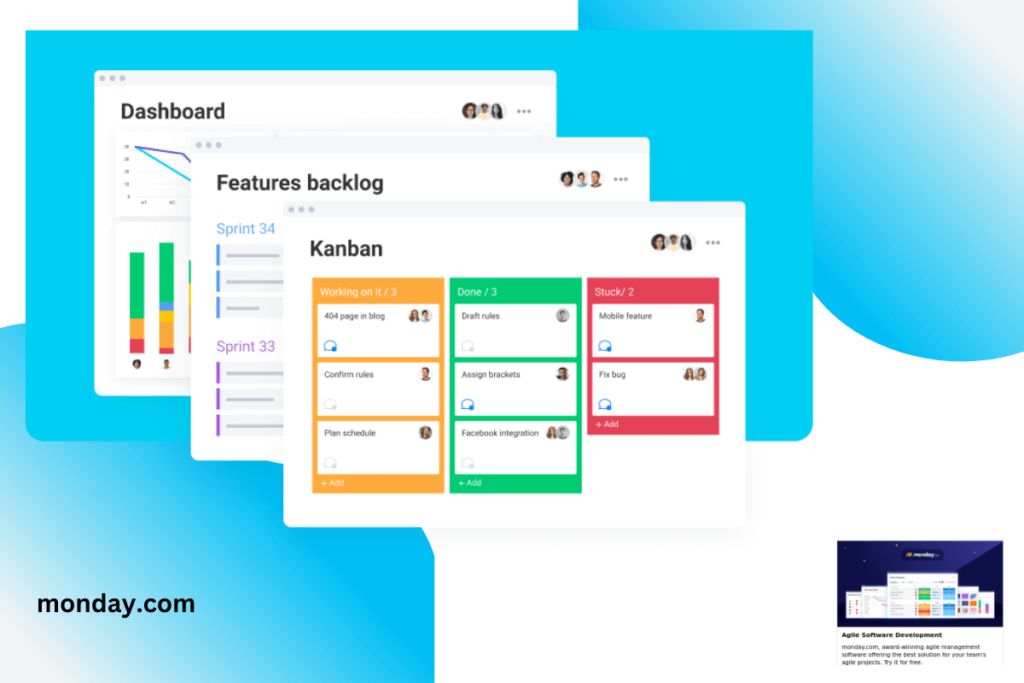
PRICING: Individual plans start at $8/month. Large companies should contact the company about bulk pricing.
Monday first launched in 2012 under the name Dapulse. It went public on Monday in 2021. The founders are Roy Mann, Eran Kampf, and Eran Zinman. Monday has headquarters in Israel. There are locations in Sydney, London, and New York City. The company offers specific tools for project management and product development.
KEY FEATURES:
- Sprint planning allows larger projects to be broken down into more manageable components. Better predict time and resources needed.
- A full-scale roadmap combines various parts to give a big picture.
- Drag-and-drop resources such as if-then planning.
REASONS TO BUY:
- Monday offers a very attractive storyboard with a lot of flexible solutions. There are many options for layouts so you can best visualise the work.
- Monday has solutions specifically for product development and management. The tools are customized and useful, not generic.
REASONS TO AVOID:
- Monday comes highly recommended, but some users had issues learning the software. Training may be time-consuming.
- There are no data analysis tools such as pivot tables available.
FAQ
Q. Why does my company need project management software?
A. Project management software enables you to juggle the many tasks and individuals that go into product development. Some businesses do try to manage without it. However, this can cause delays, miscommunication, and mistakes. Project management software helps you easily map the stages and processes that make up a project. You can divide large-scale, complex projects into manageable steps using storyboarding, timelines, and scheduling. Employees can be managed with the software, too. Access to worker information lets you make sure workers are staying on-task and displaying the proper degree of focus. Real-time clock-in and device management let you check what teams and individuals are working on. You can quickly identify and mitigate problems. Most businesses see an increase in productivity with project management software.
Q. How do I choose the right project management solution for my business?
A. When choosing the right project management software, you need to determine what your company wants. First, consider the company’s existing strategies. Look at what is and isn’t working. Maybe you have a great group of people, but they don’t function as a cohesive team. Perhaps there is a lack of organization, leading to important work being misplaced or due dates passing without results. Employees may have great ideas but lack the focus and motivation to implement them. You’ll want a solution that fills those gaps and resolves the types of issues you’ve been facing. However, you probably don’t want to pay more for software that focuses on areas you’ve already got covered. Decide on the features you really need and those which are unimportant. Then, seek out the brands that meet your specific needs. If you need to keep a closer watch on staff, look for an option that provides real-time monitoring, screen-shots, or features that ensure workers are focused. If you need more organization, find one with a great UI and precise structure for planning.
Most project management software allows you to break down large projects into smaller tasks. Scheduling software lets you assign and reassign staff, to make sure you always have the right team for the job. Consider the size of your company and how many people typically work on different projects. Some brands focus on the needs of big companies while others address small business concerns. Pricing may also be an issue. Some brands offer cheap solutions while others intended for enterprise can be very expensive.
It’s also important to consider your company’s culture and identity. Some corporations prefer structure and strict compliance. Others are more flexible and want to encourage creativity in the staff. Choose a brand that respects your business’s style. Avoid choices which seem too invasive or seniority driven, while also steering clear of ones which are overly lax or don’t deliver results. Finally, make sure project management software fits with your existing software. Your company already uses many different apps and tools. Most project management software integrates with at least some popular solutions. Check for compatibility. This helps minimize frustration and makes onboarding smoother.
Q. Which industries need project management software?
A. Companies in many different industries can benefit from project management software designed for product development. Any business that creates products can utilize this type of software. It’s most commonly used by marketing, construction, manufacturing, and IT brands. However, large-scale educational establishments and small Shopify-style sellers also make use of it. Many freelancers and contractors use it, too. Product management software keeps everyone on task and helps you organize your time.
Q. How long will it take to train my staff to use this software?
A. The time it takes to fully onboard a new product management solution can vary. Teams led by experienced professional project managers can start using the software quickly. Many features are designed to be intuitive and easy to figure out. However, some brands are more complex and could require extra work to adapt to. When purchasing, ask the company what sort of training they provide. Some brands offer video lessons or operate a series of on-site training classes. This helps staff quickly get used to and start using the software. Others may only have written manuals. Choosing a brand that works with existing software shortens the adjustment period. Consider consulting with team leaders when buying a new project management solution. Some companies also offer free trials. Take advantage of these and let staff decide whether they are comfortable with the interface and options.
